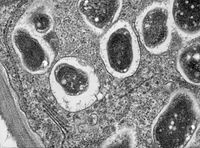
Photo from wikipedia
The present study was designed to determine the role of plant growth-promoting rhizobacteria (Pseudomonas aeruginosa &Burkholderia gladioli) in alleviating Cd stress in Lycopersicon esculentum. Cd concentration of 0.4 mM enhanced superoxide… Click to show full abstract
The present study was designed to determine the role of plant growth-promoting rhizobacteria (Pseudomonas aeruginosa &Burkholderia gladioli) in alleviating Cd stress in Lycopersicon esculentum. Cd concentration of 0.4 mM enhanced superoxide anions, MDA and H2O2 by 136%, 378% and 137% that also caused nuclear and cell viability damage. Cd enhanced the activities of enzymatic antioxidants such as CAT, GST, GPOX, DHAR, and GR by 64%, 126%, 265%, 25% and 93% respectively. However, SOD, POD and PPO was decreased by Cd and enhanced by 119%, 198% and 42% by inoculation of P. aeruginosa and 65%, 119% and 33% by B. gladioli. The contents of non-enzymatic antioxidants and total antioxidants (WSA, LSA) were also enhanced in response to metal stress and reduced by supplementation with PGPR. Confocal microscopy revealed improved cell viability and decreased nuclear damage in Cd-treated L. esculentum roots supplemented with PGPRs. Gene expression studies conducted through qRT-PCR revealed that expression levels of the SOD, POD, and PPO genes were enhanced by 478%, 830% and 253%, while the expression of CAT, GR, GST, GPOX, and APOX genes decreased by 97%, 87%, 75%, 82%, 88% in P. aeruginosa-inoculated Cd-treated seedlings. Also, B. gladioli elevated the expression of SOD, POD and PPO genes and reduced the expression of CAT, GR, GPOX, APOX and GST genes respectively. Therefore, the results suggest that Cd induced oxidative stress in L. esculentum seedlings was reduced by PGPRs through modulation of antioxidative defence expression as demonstrated in terms of antioxidants both quantitatively as well as qualitatively.
Journal Title: Chemosphere
Year Published: 2019
Link to full text (if available)
Share on Social Media: Sign Up to like & get
recommendations!